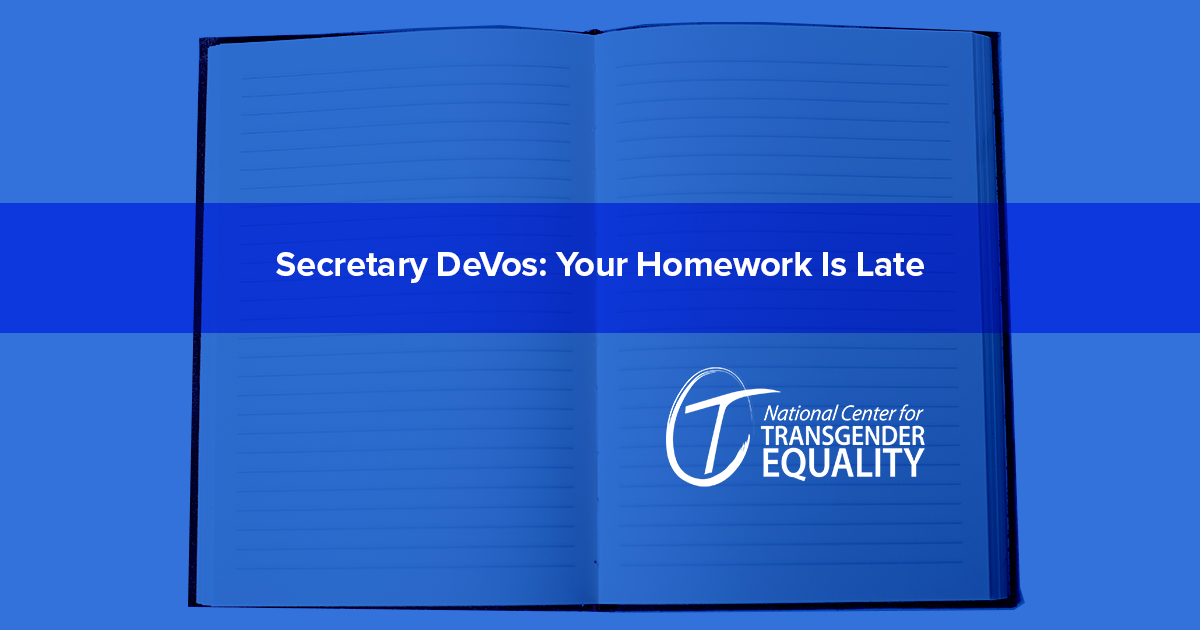Secretary DeVos: Your Homework Is Late
Image

Since withdrawing critical guidance supporting transgender students weeks ago, Education Secretary Betsy DeVos has been saying one thing and doing another. She says she is “committed” to ending discrimination and that her action “does not leave students without protections”—even while sending a dangerous message that transgender students are worth less than their peers and whether to treat them equally is up to state and local officials.
Transgender students, their families, and their schools deserve clear answers: is the federal government going to simply ignore or flatly reject any complaint of harassment, abuse, or discrimination? Is it going to arbitrarily pursue some discrimination complaints and not others?
Several members of the Senate’s education committee, including Ranking Member Patty Murray, are also looking for answers. They sent a letter three weeks ago with 11 questions for DeVos about LGBT students and Title IX, asking her to respond by February 24. One week after that deadline, there is still silence from the Secretary.
Why the silence? Perhaps because there is no way to reconcile DeVos’s stated “commitment” to schools “free of discrimination” with her and the Trump Administration’s actions.
NCTE will continue to fight for fairness and dignity for trans students across the country. Visit NCTE’s School Action Center for resources you can use to advocate for equality at the state and local level.
Here are the questions the Senators asked:
1. In your statement on the new Title IX guidance you said that you “consider protecting all students, including LGBTQ students, not only a key priority for the Department, but for every school in America. We owe all students a commitment to ensure they have access to a learning environment that is free of discrimination, bullying and harassment.” Please state with specificity the ways in which the learning environment for transgender students is made safer by the revocation of the guidance.
2. How is the withdrawal of transgender guidance consistent with the “federal mandate” and “moral obligation” you describe all schools as having to protect students from bullying, harassment, and discrimination?
3. Do you believe that states and localities may choose whether to comply with federal civil rights laws?
4. The new Title IX guidance states that “in this context, there must be due regard for the primary role of the States and local school districts in establishing education policy.”
a. Is the Department’s interpretation of the law that states and localities may individually decide whether Title IX protects transgender students?
b. What is the “context” referenced in the new Title IX guidance?
5. Please provide examples of situations that, in the Department’s opinion, would violate transgender students’ rights under Title IX.
6. Will the Department’s Office for Civil Rights (OCR) consider a school in compliance with Title IX if it chooses to rely on the guidance provided in the Dear Colleague Letter on Transgender Students dated May 13, 2016?
7. In your statement about the new Title IX guidance you say “[a]t my direction, the Department's Office for Civil Rights remains committed to investigating all claims of discrimination, bullying and harassment against those who are most vulnerable in our schools.”
a. How will OCR evaluate claims of bullying and harassment by transgender students?
b. What federal law will OCR look to in order to understand schools’ obligations to protect transgender students?
c. If a transgender student files a complaint with OCR because the student is being forced to use a bathroom that is inconsistent with their gender identity, will OCR investigate the complaint under Title IX and take action to remedy the violation of that student’s rights?
8. The new Title IX guidance states that the Department “will explore every appropriate opportunity to protect all students and to encourage civility in our classrooms.” What specific steps will the Department take to protect transgender students and encourage civility? Is it the Department’s position that encouragement of civility is sufficient to protect transgender students’ civil rights?
9. Please describe the process by which the U.S. Departments of Education and Justice made the joint decision to revoke the transgender guidance.
a. Who made the decision to revoke the transgender guidance?
b. What offices within the Department were consulted before the guidance was revoked?
c. What communication did the Department receive from the Department of Justice regarding this matter?
10. Did the Department consult with any advocates for transgender people before revoking the guidance?
11. Did the Department consult with any non-governmental entity before revoking the guidance? Please state with specificity what organizations and individuals were consulted, on what date were they consulted, for what purpose were they consulted, and what documents or other information such persons provided to the Department regarding the revocation of this guidance.

